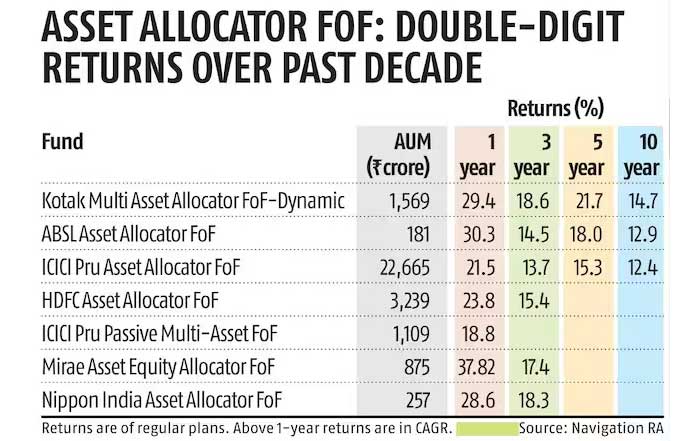'By investing in a basket of funds, FoFs can help minimise the impact of underperforming funds, thus reducing overall investment risk.'

At a time when asset classes like equities and gold have given high returns and are trading at near-peak levels, investors often struggle to pick the right investments.
In such a scenario, fund of funds (FoFs) can be an effective tool for portfolio allocation. Recent tax changes in the budget have enhanced the appeal of these funds.
FoFs invest in units of other mutual fund schemes. The FoF fund manager picks multiple schemes, depending on the FoF's mandate.
"FoFs are an extension of why investors come to mutual funds-- to seek professional management. They provide a convenient one-stop solution to investors," says Chirag Mehta, chief investment officer, Quantum Asset Management Company.
They provide the benefit of diversification. "By investing in a basket of funds, FoFs can help minimise the impact of underperforming funds, thus reducing overall investment risk," says Akhil Chaturvedi, chief business officer and executive director, Motilal Oswal AMC.
Diverse investment mandates
FoFs come in various forms. Some are based on asset allocation, investing in a mix of equity, debt, and commodities like gold and silver.
Such schemes can have plans catering to different risk profiles--aggressive, moderate, or conservative.
Some, such as equity FoFs, are asset-specific: they may invest in domestic equity funds or overseas mutual funds and exchange-traded funds (ETFs).
Some FoFs stick to in-house funds, while others allow investment in schemes belonging to other fund houses as well.
FoFs may invest in active or passive funds.
"Passive FoFs serve the purpose of filling an asset-class void in the portfolio.
"For multi-asset or equity strategies, active FoFs are preferable, given the inefficiencies in the Indian market which offer the potential for long-term outperformance," says Mehta.

Cost implications
FoFs invest in direct plans of the target mutual fund schemes. But the FoF charges its own expense ratio, leading to duplication of costs.
"A disadvantage of FoFs is the additional layer of expense which an investor has to bear," says Parul Maheshwari, certified financial planner.
FoFs can also lead to over-diversification in an investor's portfolio.
"This might limit the potential for significant gains from individual high-performing assets within the portfolio, or dilute the impact of outperforming funds," says Chaturvedi.
Improved taxation
Changes in taxation rules in Union Budget 2024 have revived investor interest in FoFs. These schemes were taxed earlier as debt schemes, with the gains (irrespective of holding period) being taxed at slab rate. After the budget, FoFs investing more than 90 per cent of their corpus in equity ETFs are taxed at 12.5 per cent if gains are booked after a holding period of 12 months.
Short-term capital gains (which arise if the units are held for less than 12 months) are taxed at 20 per cent.
"Equity FoFs have become more tax efficient and are now treated on a par with individual equity funds," says Chaturvedi.
Take a long-term view
FoFs are ideal for first-time investors or those looking for a one-stop solution.
"FoFs work well for do-it-yourself (DIY) investors who don't have the necessary knowledge or don't want to make any changes in their portfolio themselves," says Maheshwari.
Investors need to take a minimum five-year view if they are investing in an equity-oriented FoF.
Disclaimer: This article is meant for information purposes only. This article and information do not constitute a distribution, an endorsement, an investment advice, an offer to buy or sell or the solicitation of an offer to buy or sell any securities/schemes or any other financial products/investment products mentioned in this article to influence the opinion or behaviour of the investors/recipients.
Any use of the information/any investment and investment related decisions of the investors/recipients are at their sole discretion and risk. Any advice herein is made on a general basis and does not take into account the specific investment objectives of the specific person or group of persons. Opinions expressed herein are subject to change without notice.
Feature Presentation: Ashish Narsale/Rediff.com








